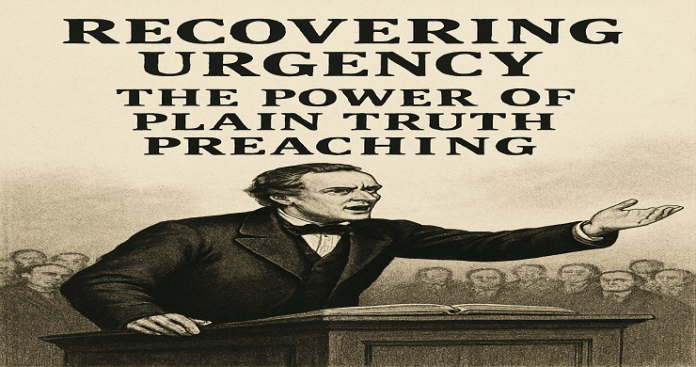The Power of Recovering Urgency By Preaching Plain Truth
The preaching of Charles G. Finney shaped revival culture in 19th-century America. His voice carried power not because of volume but because of plain truth preaching. Finney believed sermons should awaken the conscience, press the will, and demand a response. In contrast to the poetic and often abstract preaching styles of his era, he offered sermons that cut straight to the heart.
Finney’s preaching called for immediate turning away from rebellion. He did not entertain or soothe. He confronted listeners with eternal truths in everyday language. That approach remains both timeless and necessary today.
The Need for Urgency in Today’s Pulpit
Many modern sermons seek to inspire, comfort, or encourage. These goals are not wrong, but they often lack urgency. Finney taught that souls hang in the balance during every sermon. Preachers must not merely inform or uplift. They must confront.
Gospel preaching, according to Finney, is not complete until the sinner understands their guilt. It must push hearers to decide: will they submit to God or continue in rebellion? The pulpit must not echo polite suggestions. It must call for action.
What Finney Rejected: Flowery Sermons
Finney criticised sermons filled with complex rhetoric and theological polish that failed to move hearts. He wrote, “A preacher must talk to make people feel that they are not merely being entertained.” For Finney, eloquence without effect was useless.
He avoided long introductions or philosophical meandering; his words aimed at the conscience. The goal was not applause but conviction. He wanted the people to feel the weight of their decision and the urgency of responding to the gospel.
Direct Language Produces Conviction
Finney believed that emotional response should flow from intellectual and moral clarity. His sermons used simple words but pointed logic. He held up God’s law as a mirror and asked listeners, “Do you see yourself rightly?”
An example of his style: “Sinner, your refusal to repent is not weakness; it is willful rebellion.” That one sentence captures his approach. It names the sin and forces a choice. This is the essence of plain truth preaching.
Modern preachers often focus on narrative or encouragement. These have value but can miss the convincing edge. Finney’s method drew people to the altar not because they were stirred emotionally, but because they saw clearly the need to respond.
Calling for Immediate Response
One of Finney’s most controversial practices was inviting sinners to make a public decision. He introduced the “anxious seat,” where those under conviction could come forward. This visible act marked a turning point in a person’s spiritual journey.
Finney believed that delayed obedience was disobedience. He would say, “God commands you to repent now.” Many churches today wait for a quiet heart change. Finney called for bold, public declarations. He wanted people to be unmistakably aware that they had crossed from death to life.
Today’s altar calls and public baptisms reflect his influence. But the deeper idea was that truth demands action. Every sermon, Finney believed, should end with an opportunity to obey.
Preaching Must Target the Will
Finney made a distinction between feelings and choices. He wanted people to feel conviction, but only if it moved them to choose repentance. A person could weep under guilt and still refuse to surrender.
He didn’t speak merely to stir emotions. He aimed at the will. Preaching, to him, was not an art form. It was a direct spiritual confrontation. It was persuasion in the highest sense. Not manipulation, but moral clarity.
Today’s preachers can learn from this. A good sermon does not only say what is true. It urges hearers to act upon that truth now.
Examples of Finney’s Sermon Style
One famous line from Finney reads: “If you die tonight, you will face the God whose laws you’ve trampled.” This statement is not cruel. It’s compassionate urgency. He believed that truth without clarity is like medicine left in the bottle.
Another: “Do you imagine God will forget your indifference? He sees it now. Unless you turn, judgment is certain.” These lines were not rare flourishes. They were the core of his message.
For a more in-depth reading, you can access Lectures on Revivals of Religion online through the Christian Classics Ethereal Library, or buy the book (Affiliate Link).
Overcoming Fear of Offence
One reason urgent preaching has faded is fear of offending. Finney addressed this head-on. He claimed that preachers who fear men more than God are unfit for the task. Gospel truth divides. It must. Jesus said He came not to bring peace, but a sword.
That does not mean harshness. Finney’s preaching was earnest, not angry. He pleaded, but did not flatter. He called sin what it was, but always pointed toward grace.
Pastors today must recover the courage to preach unpopular truths. The culture may resist, but people still hunger for something solid and eternal.
Practical Application for Today’s Church
Churches that desire revival must begin with their pulpits. Powerful preaching starts with the preacher’s own conviction. They must believe what they say, feel its weight, and deliver it plainly.
Here are practical ways to return to Finney’s method:
- Use direct language: Avoid religious jargon. Speak as if your hearers must understand now.
- Call for a decision: Don’t leave people wondering what they’re supposed to do next.
- Confront sin honestly: Don’t soften words that God does not soften.
- Preach with eternity in view: Every sermon may be someone’s last chance.
- Pray deeply before preaching: Finney believed prayer prepared the soil for truth to take root.
Churches must decide: will they shape their message for comfort, or change? Finney’s model proves that plain truth preaching can shake a generation.
The Spirit and the Word Must Work Together
Finney never believed that preaching alone could cause revival. He insisted that the Holy Spirit must empower both preacher and hearer. But the Spirit works through truth, and it is truth, plainly spoken, that God often uses to pierce the heart.
The same God who brought revival in Finney’s day is alive today. But He still uses human voices to carry His message. If churches will preach as Finney preached, plainly, urgently, and boldly, then perhaps the Spirit will stir again.
Hearts are still hard. The gospel is still powerful. What remains is the messenger’s faithfulness.
Preach as though it matters—because it does.


 Search The Bible the way you have always wanted to.
Search The Bible the way you have always wanted to.


 The most complete Bible study Platform. Start you Free trial Now!
The most complete Bible study Platform. Start you Free trial Now!

